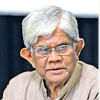Finance adviser dissatisfied over unstable commodity prices despite duty cuts

Finance Adviser Salehuddin Ahmed expressed dissatisfaction over the stubbornly high prices of essential commodities in the domestic market, even after reducing their import duties.
Although the National Board of Revenue (NBR) has drastically slashed import taxes on rice, onion, edible oil, potato, sugar and eggs in the last three months since the interim government came to power in early August, the prices did not fall, he said.
He made the comments at a programme organised by the Palli Karma-Sahayak Foundation (PKSF) at its office to celebrate the foundation's 34th founding anniversary.
Ahmed said he faced anger from people when he was in charge of the commerce ministry, as the prices of eggs and onions were not falling despite reducing import duties.
He said it is not the job of the commerce ministry alone to keep the market stable.
"Many factors are there. But I don't blame people for becoming impatient. Because they are not getting enough even after spending Tk 500 in the kitchen market," he said.
"But we are trying. Things are not very easy."
He said there was criticism of his decision to allow the export of 3,000 tonnes of hilsha to India, which accounted for less than 0.5 percent of the total production of the fish.
Ahmed said the chief adviser described the decision as positive and thanked him. "I did not share this publicly. I took the blame on my shoulders," he said.
"Sometimes we have to make difficult decisions. But if our institutions are not strong, proper implementation doesn't happen even if we undertake good projects," said Ahmed.
There are big and beautiful buildings but no honest people, and there is a lack of transparency and accountability, the adviser said.

 For all latest news, follow The Daily Star's Google News channel.
For all latest news, follow The Daily Star's Google News channel. 







Comments